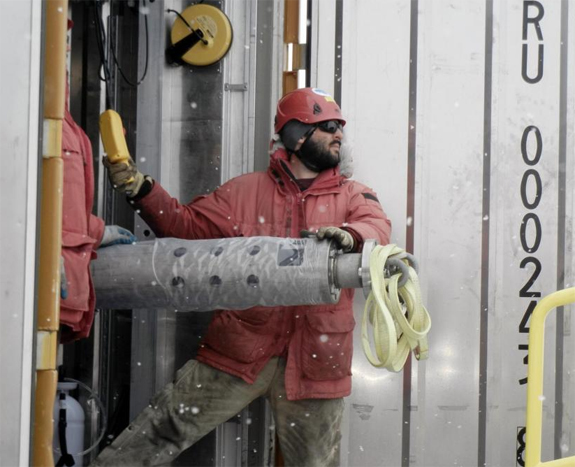Round Three: Drills vs. Insanely Thick Antarctic Ice. Fight!
The hunt for microbial life in Antarctic subglacial lakes continues. Now it’s the American’s turn

Scientists prepare to test their drilling equipment near McMurdo Station, Antarctica. Photo: WISSARD / Betty Trummel
It’s been a busy year for Antarctic exploration. Earlier this year, a Russian team announced that they had managed to successfully drill through 2.4 miles of glacier ice into subglacial Lake Vostok. The Russians were looking for microbial life hidden beneath the ice, but they have so far come up empty handed. Then, in December, a British team tried and failed to push through 2 miles of Antarctic ice into another subglacial lake, Lake Ellsworth.
Scientists did recently find life hidden in Lake Vida, another Antarctic body of water. But that was a shallow and relatively young lake compared to lakes Vostok and Ellsworth.
But now, says Nature, it’s time for the Americans to try their hand. On Sunday, a team of scientists made their way from McMurdo Station to the West Antarctic Ice Sheet where they aim to sample from subglacial Lake Whillans, one of the lakes that underlies the Whillans Ice Stream. Lake Whillans is buried about half a mile down.
Later this week, the American team will begin using a hot water drill to push through the ice—the same technique used by the British Lake Ellsworth team.
According to The New York Times, the U.S.’s Lake Whillans project differs from the Vostok and Ellsworth missions “in several ways.”
Lake Whillans is smaller and not as deep, and is replenished more quickly from other water sources under the Antarctic ice shelf. It is a basin in a subglacial river where water accumulates to form a lake but keeps flowing, eventually reaching the ocean.
As such, any potential microbial life won’t likely be quite so disconnected from the environment, as is the case for the other two subglacial lakes.
You can follow along with the Lake Whillans project on twitter or on Facebook.
More from Smithsonian.com:
Antarctica’s Subglacial Lake Ellsworth Will Keep Its Secrets For Now
Bacterial Life Abounds in Antarctic Lake, Cut Off From the World for 2,800 Years
No Life Found In Lakes Beneath Antarctic Glaciers—Yet
/https://tf-cmsv2-smithsonianmag-media.s3.amazonaws.com/accounts/headshot/smartnews-colin-schultz-240.jpg)
/https://tf-cmsv2-smithsonianmag-media.s3.amazonaws.com/accounts/headshot/smartnews-colin-schultz-240.jpg)